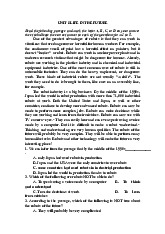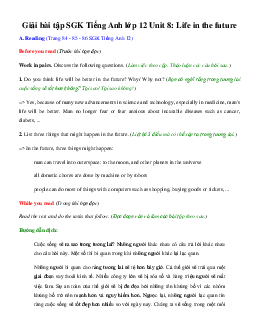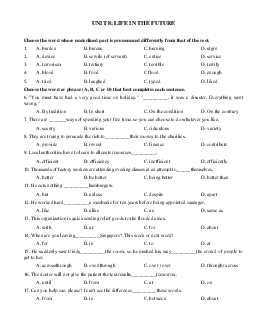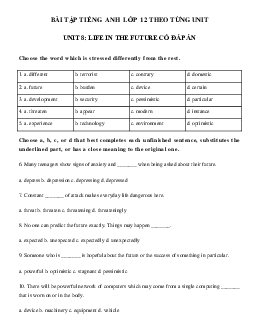










Preview text:
Bài tập tự luận Tiếng Anh lớp 12 Unit 8: Life in the future có đáp án
I. Choose the word whose vowel sound is different from that of the provide one. 1. life wipe Chinese micro Jupiter 2. sort worse chore launch thought 3. ahead breath threat disease fresh 4. good could food pull foot 5. out bound found how ought 6. thank space hand happen travel 7. power own our crowd count 8. speed peace scene few piece 9. straight great air take aim 10. achieve peace receive street science
II. What do you call a person who…
1. Thinks that the worst thing will happen in every situation?
2. Uses violence in order to achieve political aims? 3. Is 100 years old or older?
4. Tends to expect that good things will happen?
5. Travels and works in space?
6. Wants to protect the environment?
7. Is traveling or visiting a place for pleasure?
8. Studies one or more of the natural science?
9. Has the legal right to belong to a particular country?
10. Has a job in politics, esp. a member of the government?
III. Complete each of the sentences with the correct form of the word form the box.
Pessimist eradicate optimistic expected incredible
Eternal efficient terrorize expect depress
1. Inflation will never be completely……………..from the economy.
2. Public cooperation is vital in the fight against…………….. .
3. He is now so weak the doctors are……………..about his chances of making a full recovery.
4. The government expressed……………..about the success of the negotiations
5. Many people lost their jobs in the great……………..of the 1930s.
6. Japanese people have a very high life…………….. .
7. Will the universe continue to expand……………..?
8. The inspectors were impressed by the speed and……………..of the new system.
9. Help came from an……………..quarter.
10. It was……………..difficult to fit everyone in.
IV. Fill in blank with one appropriate word to complete the passage.
Ask most people (1)……………..is happening to the world’s population and they are likely to
say it is exploding. Ask them (2)……………..there will be enough food next century and they will
say no. Ask them (3)……………..the world’s energy supplies and they will say they are running
(4)……………..and we will all be sitting in the dark and cold next century. Ask them what they think
(5)……………..raw materials and they will say we are using them up (6)……………..a rate that will
mean there are none (7)……………..for our Grandchildren.
These statements have two things (8)……………..common. They are too gloomy, if not about
this century then the next. And they are all wrong. Or so it is persuasively argued in a book
(9)……………..tries to chart our future (10)……………..the next quarter century. Most of the
attention the book has received so far has concentrated (11)……………..its forecasts for Britain and
the prospect (12)……………..five million unemployed.
V. Fill in the blanks in the sentences below with the prepositions in, on or at.
1. John F. Kennedy was the first president of the United States to be born……………..the twentieth century.
2. Fruit treets generally bloom……………..April or May.
3. Gettysburg, the greatest battle ever fought……………..North America, took
place……………..July 1863.
4. I like to shower……………..the morning, but my roommate likes to shower……………..night.
5. The President lives…………the White House, which is located……………..1600 Pennsylvania
Avenue……………..Washington, D.C.
6. Many advertising egencies are located……………..Madison Avenu…………..New York City.
7. Mozart died………….Vienna……………..1791……………..the age of 35.
8. I saw several people I know………….the barbecue…….…..Saturday afternoon.
9. Leaves turn red and gold……………..the autumn.
10. Most college football games are played……………..Saturdays.
11. People remember the dead……………..the anniversary of the terrorist attack.
12. Lisa’s birthday is……………..the end of March, ……………..March 29.
13. There will be lots of excitement……………..the coming weeks.
14. Dean Hughes office is……………..the Administration Building……………..the third floor.
15. Crowds of football fans……………..blue shirts were coming along the street.
16. Did you hear that news………....television or read it……………..the newspaper?
17. Videophones are not practical…………..present, but they may be……………..the near future.
18. The members of a jury are chosen……………..random from a list of voters.
19. Mr. Grigsby is……………..charge of the marketing department.
20. I’m sure he didn’t break the plate……………..purpose.
VI. Put in the missing preposition.
1. The teacher says we’ve got to do the test, so there’s no point…………….. arguing……………..it.
2. They succeeded……………..escaping……………..the burning house.
3. I am not interested……………..anything that happened……………..the very remote past.
4. I wasn’t aware……………..any problems……………..the new design.
5. The children are very fond……………..swimming……………..summer they spend most of their
time……………..the water.
6. How are you getting……………..at school? – I’m getting……………..all right
except……………..English. I’m very bad……………..it.
7. I’m sorry……………..being late……………..Monday.
8. I’m not exactly keen……………..cooking, but I prefer it…………….. washing up.
9. I object……………..being kept waiting. Why can’t you be……………..time?
10. I was so afraid……………..missing the train that I took a taxi……………..the station.
11. I first learnt…………..his decision to resign when it was announ……………..the radio last night.
12. I disapprove……………..people who make all sorts……………..promises which they have no
intention……………..keeping.
13. The government has agreed……………..a puplic inquiry……………..the Helicopter crash.
14. Doctors are concerned……………..the prospect……………..heart patients having to wait up a year for surgery.
15. I Think it’s important to become familiar……………..cultures and customs
different……………..your own.
16. It is good to be pleased……………..ourselves and proud …………….. Ourselves when we have done a good job.
17. There is a severe lack……………..affordable housing……………..the city and many people are homeless.
18. Benny Carter had a significant influence……………..the development……………..British jazz.
19. I am against any form of cruelty……………..animals and would support
a ban……………..hunting.
20. She stared in amazement……………..the sight that met her eyes – Dave had shaved all his hair…………….. .
VII. Complete the sentences, using the information given. Add suitable propositions and make
any other grammatical changes if necessary.
1. The hotel gives you everything except a toothbrush!
It provides……………………………………………………………………............. 2. She looks like my cousin.
She reminds me………………………………………………………………...........
3. ‘Well done. I’m so glad you’ve passed your exam.’
I congratulated her……………………………………………………………...........
4. It’s wrong to keep offering people drinks.
Don’t keep plying………………………………………………………………........
5. They said I’d borrowed the car without asking.
They accused…………………………………………………………………….........
6. I’d like to meet your parents.
Please introduce…………………………………………………………………...........
7. My aunt sent me a wonderful present.
I must write and thank……………………………………………………………........
8. Some people ruin their ơn lives.
But you fust can’t prevent………………………………………………………...........
9. £100 sounds reasonable for that camera. Have you looked at prices in other shops?
Have you compared……………………………………………………………….........
10. It’s not safe these dáy to make remarks about a woman’s appearance.
Feminists think it is ‘sexist’ to compliment………………………………………........
VIII. Put a/ an, the or zero article (-) in the spaces. Give all possible answers.
1. Last night we had……………..terrible storm. Our children were fright-ened by……………..thunder.
2. Frank Lloyd Wright is……………..name of……………..famous architect. He
is……………..architect who designed……………..Guggenheim Museum in New York
3. ……………..happiness of the majority depends on……………..hard work from everyone.
4. It was……………..day that would remain in my memory forever.
5. ……………..music plays an important part in……………..film. And I thought……………..music
used in this film was……………..best part.
6. ……………..washing machine had had a huge impact on……………..people’s lives since it was invented.
7. ……………..special award was given to……………..novelist Ian McMurphy.
8. It is……………..sad fact that……………..money buys political power in many countries.
9. Do you remember……………..Wilmotts? They used to live opposite us.
10. ……………..bicycle is……………..important means of transport for many people with no access
to……………..public transport.
11. ……………..earthquake in……………..south of the country has left thousands homeless.
12. I don’t usually have……………..breakfast, but I always eat……………..big lunch.
13. ……………..World Wide Fund for Nature organized a major campaign to save……………..tiger.
14. We met our good friend…………Jean Wools when we were in ………..Plymouth.
15. Margaret loved having holidays at……………..seaside, but her doctor advised her to spend time
in……………..warm climate.
16. He found himself…………..face to……………face with…………..Lieutenant Evans.
17. She was…….…..first woman to cros…………..Atlantic in ……………..canoe.
18. After she had……………..leisurely dinner downstairs Julia played …………..piano for……………..while.
19. They are at.………..sea now. They write that they are having…………..marvelous time.
20. When he was in……………..hospital she could not get………………permission to visit him.
IX. Insert a/ an, the or no article (-)
(1)……………..world wildlife is in (2)……………..danger. (3)……………reasons are complex
– (4)……………..world’s population is expanding, and the increasingly (5)……………..man is
destroying more and more of (6)…………..natural environment.
(7)……………..last dodo in (8)……………..world died on (9)…………....island of Mauritius
in (10)……………..late seventeenth century. Today, (11) ……………..black rhino in Kenya could
go (12)……………..same way. There is (13)……………..world-wide trade - much of it illegal – in
(14)……………...animals and birds. (15)……………..particular favorite, and one severely
threatened with (16)……………..extinction through smuggling is (17)……………..orang-utan,
which only survives in (18)……………..forests of Borneo and Sumatra.
(19)……………..fierce argument is now raging about how to protect (20) ……………..most
endangered species. Some people argue that (21)……………zoos, with their research work and
breeding programmes, offer (22) ……………..best hope, and (23)……………..protection from
international smugglers. But some of (24)……………..older zoos have
(25)……………..disadvantage of (26)……………..cramped city conditions, though
(27) ……………..zoo with (28)……………..wide open spaces like Whipsnade Zoo in
(29)……………..Bedfordshire countryside north of London is seen as offering
(30)……………..pleasant habitat.
X. Complete the second sentence so that it has a similar meaning to the first. Use the word in brackets.
1. Amy’s cold started last week, and she’s still got it. (since)
Amy…………………………………………………………………………….…….
2. We moved here two years ago. (for)
We…………………………………………………………………………………….
3. I realized immediately that something was wrong. (once)
I……………………………………………………………………………………….
4. I last saw you at Liver’s party. (since)
I……………………………………………………………………………………….
5. When Sandra walked out of the meeting, she didn’t say goodbye to anyone. (without)
Sandra left…………………………………………………………………………….
6. I don’t know them to speak to, though I’ve seen them. (sight)
I only………………………………………………………………………………….
7. It’s months since I’ve bought any clothes. (for)
I……………………………………………………………………………………….
8. It’s six weeks now since the term began. (ago)
The term…………………………………………………………………………….
9. I didn’t see her again for five years. (before)
Five years…………………………………………………………………………….
10. What I want more than anything is peace and quiet. (all)
What I want…………………………………………………………………….…….
11. I didn’t mean to break the vase. (purpose)
I………………………………………………………………………………...…….
12. The film starts half an hour from now. (in)
The film………………………………………………………………………...…….
Luyện bài tập tiếng Anh tại nhà ĐÁP ÁN: I. 1. Jupiter 2. worse 3. disease 4. food 5. ought 6. space 7. own 8. few 9. air 10. science II. 1. pessimist 2. terrorist 3. centenarian 4. optimist 5. astronaut 6. environmentalist 7. tourist 8. scientist 9. citizen 10. politician III. 1. eradicated 2. terrorism 3. pessimistic 4. optimism 5. depression 6.expectancy 7. eternally 8. efficiency 9. unexpected 10. incredibly IV. 1. what 2. if 3. about 4. out 5. about 6. at 7. left 8. in 9. that 10. over 11. on 12. of V. 1. in 2. in 3. in - in 4. in - at 5. in - at - in 6. on - in 7. in - in - at 8. at - on 9. in 10. on 11. on 12. at - on 13. in 14. in - on 15. in 16. on - in 17. at - in 18. at 19. in 20. on VI. 1. in – about/ over 8. on – to 15. with – from 2. in – from 9. to – on 16. with – of 3. in - to 10. of – to 17. of – in 4. of - of 11. about/ of - on 18. on – of 5. of – In - in 12. of – of - of 19. to – on 6. on – on – for – at 13. with – about/ on 20. at - off 7. for – on 14. about/ for - of VII.
1. It provides you with everything except a toothbrush.
2. She reminds me of my cousin.
3. I congratulated her on passing her exam.
4. Don’t keep plying people with drinks.
5. They accused me of borrowing the car without asking.
6. Please introduce me to your parents.
7. I must write and thank my aunt/ her for sending me a wonderful present.
8. But you just can’t prevent them from ruining their own lives.
9. Have you compared it with prices in other shops?
10. Feminists think it is ‘sexist’ to compliment a woman on her appearance. VIII. 1. a – the 8. a – zero 15. the – a 2. the – a – the – the 9. the 16. zero – zero – zero 3. zero – zero 10. the/ A – an – zero 17. the – the – a 4. a 11. the/ An – the 18. a – the – a 5. zero – a – the – the 12. zero – a 19. the – a 6. the – zero 13. the – the 20. zero – zero 7. a – the 14. zero – zero IX. 1. no 2. no 3. the 4. the 5. no 6. the 7. the 8. the 9. the 10. the 11.the 12.the 13. a 14.no 15. a 16. no 17.the 18.the 19. a 20.the 21. no 22. the 23.no 24.the 25.the 26.no 27. a 28. no 29.the 30. a X.
1. Amy had a cold since last week.
2. We lived here for two years.
3. I realized at once that something was wrong.
4. I haven’t seen you since Oliver’s party.
5. Sandra left the meeting without saying goodbye to anyone. 6. I only know them by sight.
7. I haven’t bought any clothes for months.
8. The term began six weeks ago.
9. Five years had passed/ gone by before I saw her again.
10. What I want above all is peace and quiet.
11. I didn’t break the vase on purpose.
12. The film starts in half an hour.



